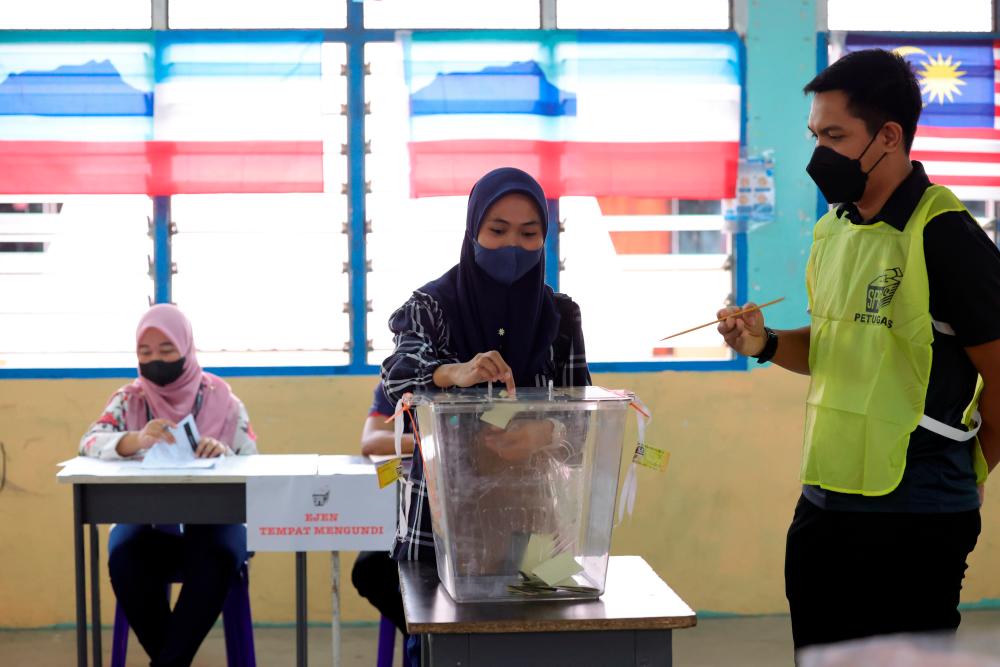PETALING JAYA: The implementation of Undi18 and automatic voter registration has worsened the unequal constituency sizes, or malapportionment of constituency seats, in Malaysia, according to political observers.
Malapportionment is the creation of electoral districts with divergent ratios of voters to representatives. For example, if one single-member constituency has 10,000 voters and another has 100,000 voters, those in the former constituency have 10 times the influence per person over the governing body.
Electoral watchdog Bersih 2.0 chairman Thomas Fann said at the end of 2021, malapportionment worsened between the lowest number of voters in parliamentary constituency P207 Igan (28,290) in Sarawak and the highest P102 Bangi (303,430) in Selangor, with the ratio of 10.7 to one.
“It means that it takes more than 10 Bangi voters to have the same representation in Parliament or that the Bangi MP has to serve 10 times as many voters as the Igan MP,” he said.
According to the Electoral Integrity Project report in 2017, Malaysia has one of the worst electoral boundaries in the world, with vast malapportionment and boundaries that do not follow administrative boundaries or irrationally divide villages or housing estates.
“The Election Commission (EC) cannot initiate a redelineation exercise within eight years after the last exercise in 2018. For Sarawak, the earliest would be 2023 while for Peninsular Malaysia and Sabah, it would be 2026.
“But if Article 46 of the Federal Constitution is amended to change the composition of Parliament, it would automatically trigger a redelineation regardless of the eight-year limit.
“Changing the electoral system to a proportional representation (PR) one as opposed to the current first-past-the-post system that depends on the apportionment of voters to constituencies would eliminate electoral manipulation through delineation and minimise the phenomenon of ‘wasted votes’, where voters of losing candidates have no representation.
“In PR, voters vote for parties instead of individual candidates and seats are allocated according to the percentage of popular votes a party received in the election,” Fann told theSun.
Political scientist Prof Dr Wong Chin Huat said Subsection 2(c) of the 13th Schedule of the Federal Constitution stipulates that the electorate sizes for constituencies within the same state have to be “approximately equal”.
“Before 1973, the maximum disparity was limited to ‘two is approximately equal to one’, namely the largest constituency could not have more than twice the electorate of the smallest. Because the quantifiable cap was removed after 1973, although the ‘approximately equal’ was retained, the EC treated that as a blank cheque.”
Wong said up until 2005, parliamentary seats (and correspondingly state seats) were added during every constituency delimitation exercise.
“Instead of correcting inter-state malapportionment, by adding seats to the more under-represented states, such seat increase often worsened the problem.
“Seats were added to over-represented Barisan Nasional strong states such as Pahang and Johor.
“Worse, seats were often (divided) with new constituencies tailor-made for Barisan Nasional component parties in mind.
“Most countries fix their number of legislative seats for a long period of time, but seats will be reallocated from states with decreasing electorate sizes to those with increasing electorate sizes, in a process called reapportionment.”
Wong said to ensure the “approximately equal” demand of the Federal Constitution is enforced in the next delimitation exercise, Parliament may pass a parliamentary act with a simple majority to spell out the acceptable range for “approximately equal”.
“Alternatively, each state can amend their state Constitution to stipulate the range of voters that each state assemblyman may represent, which will indirectly constrain the malapportionment of parliamentary constituencies in the state,” he said.
Meanwhile, Subang MP Wong Chen, who currently serves 230,940 voters in his constituency, said the role of an MP is mainly policy-making at national level.
“My first role as an MP is to debate, discuss and pass the law in Parliament. Second is to develop and improve policies including economic, political and socioeconomic in a select committee. Lastly, every year from October to December, all MPs are to debate the national budget as it is the public’s money at stake. How will it be spent? So we will debate it in the parliamentary sessions,” he told theSun.
Wong said most voters misunderstood MPs’ responsibilities with those of local authorities’.
“When voters are concerned about certain subjects at a national level, such as corruption or improving the economy, we will represent them but most of the time, 70% to 80% of them will complain to us regarding clogged drains, road paving, garbage collection and such.
“That is the job for the state government, state assemblymen and local authorities such as the Public Works Department or Subang Jaya City Council like in my place. Unfortunately, we don’t have the power to resolve residency issues ourselves.
“What we can do is advise the state assemblyman in that area to advise the local authorities to fix it. It is best for voters to directly go to their local authorities about their complaints,” he said.









